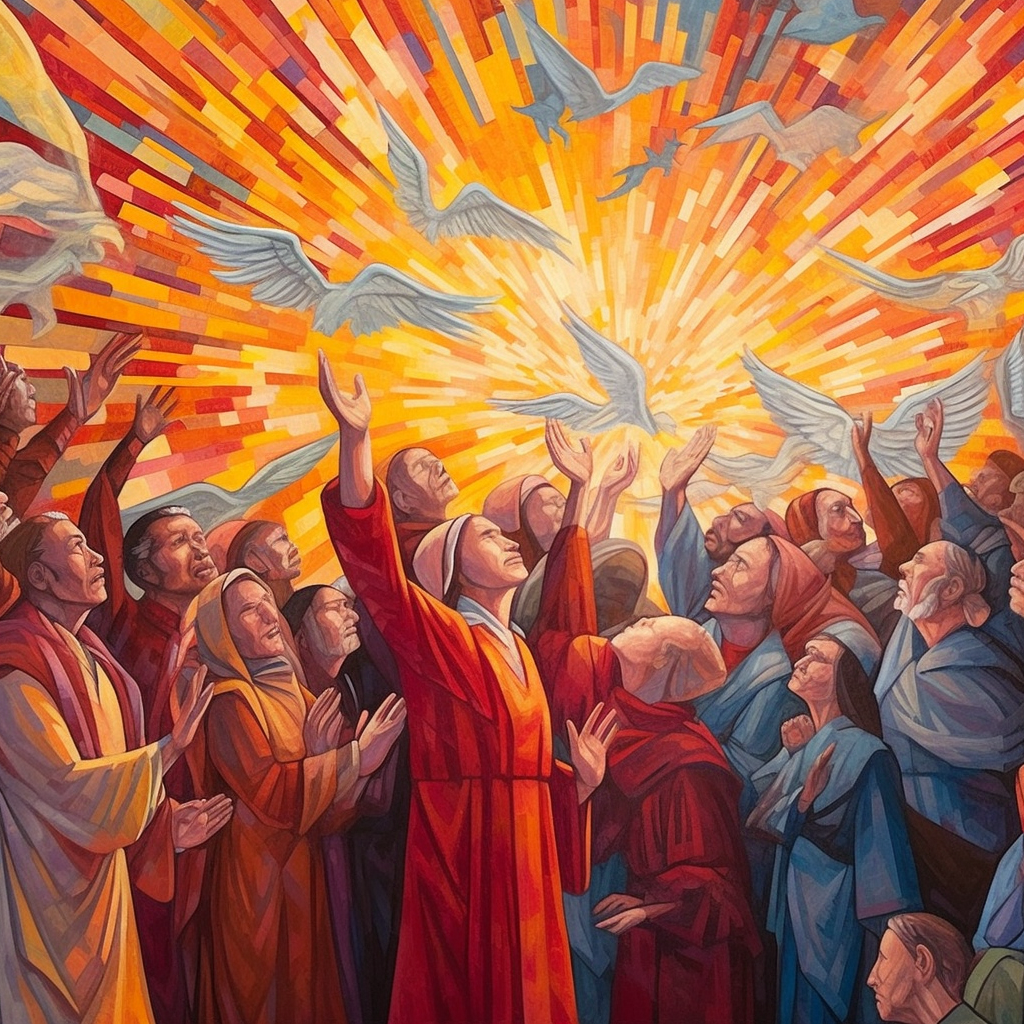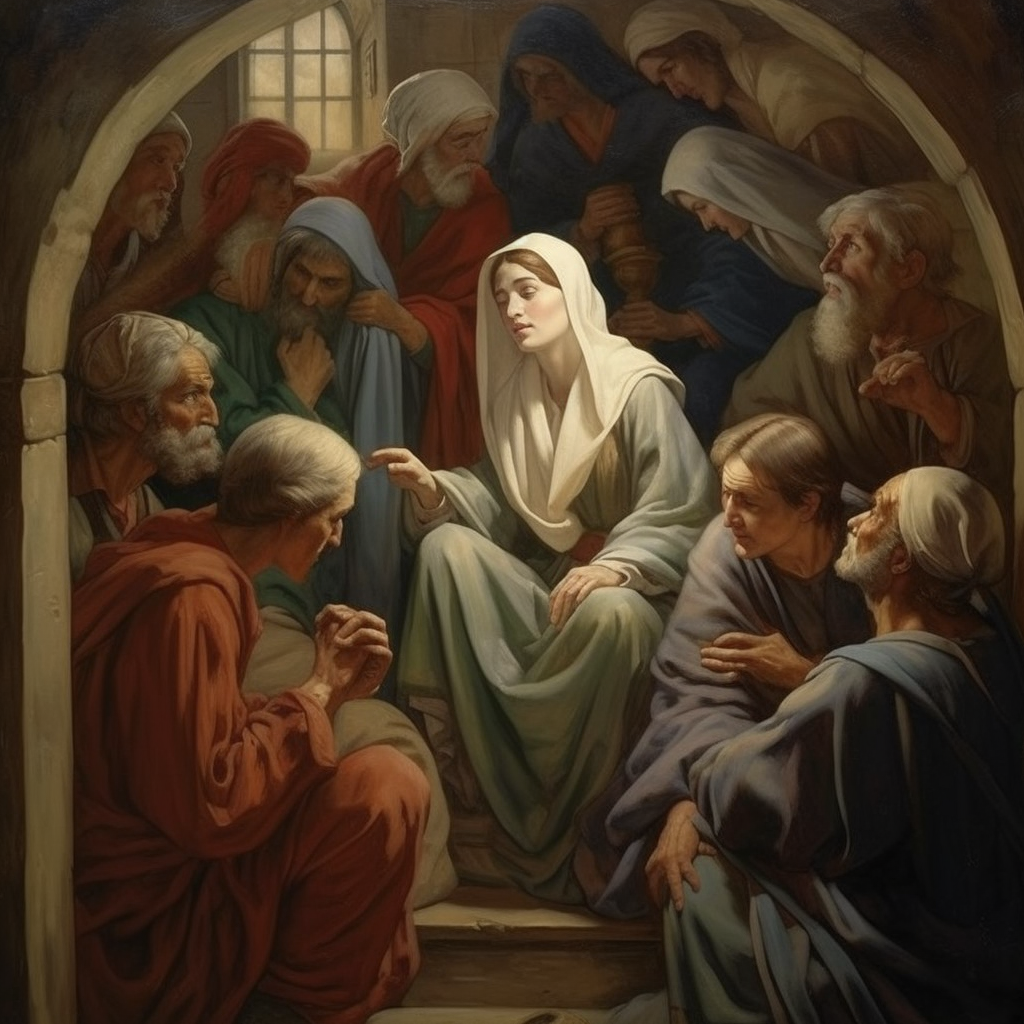Breathing in the Spirit's Rhythm

A professor of mine once said that the reason Pentecost is so much less interesting than Easter or Christmas in the popular imagination is because the Holy Spirit frightens people and frightens the Church most of all. God the Father is a safe point of consideration: We mostly think of the first person of the Trinity as present and active, but in a distant kind of way. Like the way that we know grizzly bears are great and powerful beasts, but they’re far away in a forest somewhere, doing whatever they do and we’re unlikely to have to contend with them directly in our day-to-day lives. (I would argue that this is a poor way of thinking about God the Father, but that’s a sermon for next week’s feast.) God the Son is also alive and well, active in Creation, but, since the Ascension, is off in heaven somewhere. If we do run into the returned Jesus in the middle of our day, it’s suddenly the Last Day and our present worries and questions aren’t going to be priorities much longer.
God the Holy Spirit, on the other hand, isn’t a distant figure and has never ascended and gone to be elsewhere for a while. In fact, we are explicitly told that the Spirit has been given to us by God to remain with us until that Last Day. Even if we rationalize and think our way, incorrectly, out of God the Father and God the Son being present, we cannot do the same with the Spirit. God, the Holy Spirit, is with us everywhere and always, today and every day. Right here, right now, in this very room, in every single one of us. And this is why the Spirit is frightening. Because, when we consider the Holy Spirit, we have to consider that God is busy and active and present in a way that we cannot explain or box in or control. We must accept that God’s renewing fire, God’s animating breath, and God’s empowering love are right here, in the pews beside us. Like running into that grizzly bear on a hiking trail, there’s nowhere to run and nowhere to hide. With God, you can’t even play dead to avoid the confrontation.
If we can’t avoid God, then we probably ought to reconcile ourselves to God's presence and figure out what to do in the circumstance.
Often when we begin to discuss the presence of the Holy Spirit, we move to a conversation about "spirituality". There is nothing wrong with spirituality, but in the twenty-first century West, it is a term that has moved well away from things spiritual as Christians understand them. It has come to be used, most frequently, to refer to an entirely personal, individuated experience and expression. Like so many things in the twenty-first century, these conversations privilege personal experience above all else in determining what is true. For Christians, this has never been our preferred way of engaging with God. We have always been called into community to pray, to discern, to discuss, to share, and to live.
When we Christians talk about the Holy Spirit and our spirituality, we are discussing a relationship and experience that we all share. Not only one that we all share with the same God, but one that we share with each other. After all, if there is one faith, one baptism, one Spirit, then the Spirit that animates me, inspires me, and guides me is the same one that animates, inspires, and guides the rest of the creation into which it is breathed. Our spirituality is important and worthy of much discussion, but it is far more than our preferences for one style of music, art, or even language over another.
Once we acknowledge that the Spirit is with us and we can't escape or ignore it, we must be honest about who we are in God's presence. We will quickly begin to feel the Spirit calling us to cooperate in work that feels well beyond us. We will feel frightened, inadequate, unworthy, ashamed, uncomfortable, and any number of other reactions. Often we adopt these as reasons not to respond to the calling we feel. "I'm not good at that sort of thing," or "I wouldn't do a very good job," and so on.
These are surely the same feelings that the disciples felt when they hid in the upper room, both times. Once after the crucifixion of Jesus and the second time on the Day of Pentecost following the Ascension. On both occasions the disciples knew that they had work to continue once Jesus was gone, but they were frightened and uncertain and uncomfortable and worried. On both of those occasions it took the unmistakable presence and action of God—in the news of the resurrection and the arrival of the Holy Spirit—before they were convinced that they must, themselves, act.

The Spirit of God can and will work with our fears and insecurities, but we have to be honest that they are there. We also have to be willing to follow the Spirit's call in spite of our misgivings, trusting that God will support and cover us, filling in the gaps that our human limitations produce.
In our prayer and conversation with God, we must also make time for silence. God does not need our prayers to know our needs. Indeed, we are often reminded in the prayers of the Church that God knows our needs before we ask and our ignorance in asking. We pray and then we quiet ourselves and listen for God's response to our prayers. If all we ever do is talk to the Spirit and never listen for the response, it's no wonder that we so often complain about unanswered prayers. Or a lack of a sense of God's presence in our lives.
Lastly—for this sermon, at least—we must acknowledge that, while the work of the Spirit includes us, it is not principally about any of us as individuals. Just as with the disciples in the upper room, while they were worried principally about themselves, anxiety and fear and paralysis ruled them. Once they acknowledged the Spirit's presence, were honest about their fears, listened for the Spirit's leading, and submitted their wills to that of God, they began to move with confidence and purpose.
If the Spirit is what God breathed into humanity to animate us and give us life, then it only makes sense that we will be at our healthiest, our most lively and joy-filled when our breathing matches the rhythm of the Spirit's movement. We can choose our own way, our own path, our own rhythm. But it will be hard work. It will not be the way we were made for. It won't be the work we are called to. It won't be what we live for.
God's call and presence in the Holy Spirit can be frightening. It can put us in places and situations we would never have imagined. But it can also be the answer to our prayers. The places and situations we never would have imagined can also be the places where we find ourselves most alive. Most fulfilled. Most inspired.





